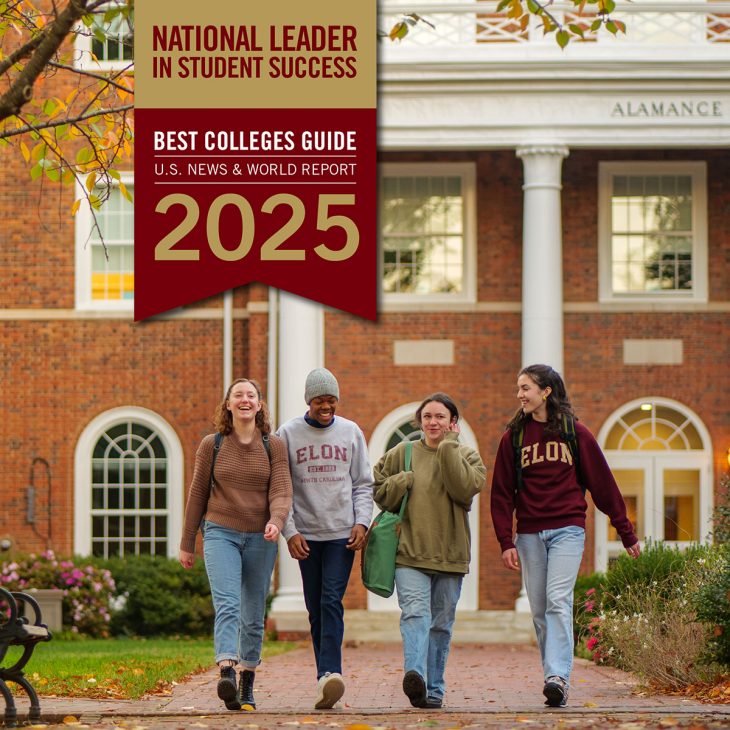Elon continues to be a leader in the “Programs that Enhance Student Experience” category as one of only two colleges and universities in the country ranked in the top 15 in all eight categories of programs linked to student success and positive learning outcomes.
Elon University has been ranked #1 in the nation for excellence in undergraduate teaching for a fourth consecutive year by peer universities, according to the annual rankings released Tuesday by U.S. News & World Report.
U.S. News & World Report asks higher education leaders each year about institutions that perform at the highest levels. Since joining the National Universities category in 2019, Elon has ranked #1 or #2 among the list of institutions that offer the highest quality of undergraduate instruction.
“Undergraduate teaching is at the core of Elon’s mission to nurture a rich intellectual community characterized by active student engagement with a faculty dedicated to excellent teaching and scholarly accomplishment,” said Elon President Connie Ledoux Book. “This ranking reflects the outstanding work of our remarkable faculty, the staff who support their teaching, and the strategic vision of the Board over the last 30 years to foster experiential and engaged learning.”
The Top 10 national universities recognized for “Best Undergraduate Teaching” this year:
#1 — Elon University
#2 — Princeton University
#3 — Brown University
#4 — Georgia State University
#5 — Dartmouth College
#6 — Boston College
#7 (tied) — Arizona State University
#7 (tied) — Carnegie Mellon University
#7 (tied) — Rice University
#10 (tied) — Duke University
#10 (tied) — Miami University – Oxford
#10 (tied) — University of Notre Dame
 Elon was named a national leader in the annual U.S. News “Best Colleges” guide’s “Programs that Enhance Student Experience” feature for a 10th consecutive year. This feature looks at eight categories of programs linked to student success and positive learning outcomes, and this year Elon and Duke University were the only institutions to be ranked among the top 15 in all eight categories.
Elon was named a national leader in the annual U.S. News “Best Colleges” guide’s “Programs that Enhance Student Experience” feature for a 10th consecutive year. This feature looks at eight categories of programs linked to student success and positive learning outcomes, and this year Elon and Duke University were the only institutions to be ranked among the top 15 in all eight categories.
This recognition is across a broad range of programs including study abroad, first-year experiences, learning communities, internships and undergraduate research. Elon ranked #1 in first-year experiences and learning communities and was among the top 12 in all eight categories this year. Other highly ranked institutions include Agnes Scott College, which ranked in the top 20 in seven categories, and Amherst College, Princeton University and Stanford University, which each ranked in the top 20 in five categories.
Elon has the following rankings in the eight academic and cocurricular programs linked to student success and positive learning outcomes:
#1 – Learning Communities
#1 – First-Year Experiences
#2 – Study Abroad
#2 – Service Learning
#2 (tied) – Senior Capstone
#8 – Writing in the Disciplines
#9 (tied) – Co-ops/Internships
#14 (tied) – Undergraduate Research/Creative Projects
Elon was again recognized as one of the country’s most innovative schools, earning a #15 ranking in the category. The Most Innovative national universities list includes those making innovative improvements in curriculum, faculty, students, campus life, technology or facilities.

Elon moved up the ranks among national universities, a category the institution joined in 2019 after being classified as a Doctoral/Professional University by the Carnegie Classification of Colleges. Moving up 12 places this year, Elon ranked #121 among national universities, which includes institutions that focus on research and offer multiple doctoral programs. The top schools in the National Universities category this year are, in rank order: Princeton University, Massachusetts Institute of Technology, Harvard University, Stanford University, Yale University, California Institute of Technology, Duke University, Johns Hopkins University, Northwestern University and the University of Pennsylvania.
U.S. News & World Report has been producing college rankings since 1983. The rankings are based on an extensive annual data survey of institutions along with opinion surveys of university faculty and administrators. Its methodology is available here.



